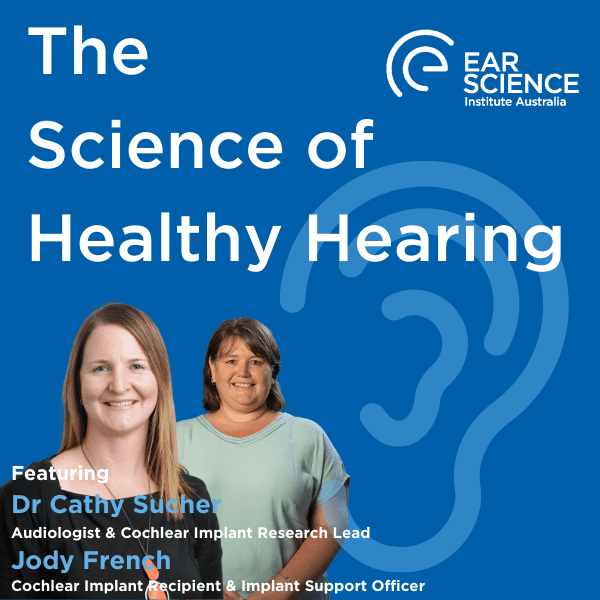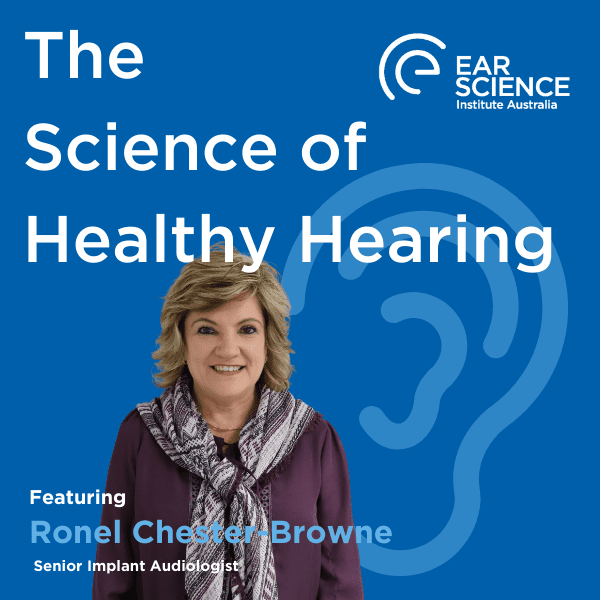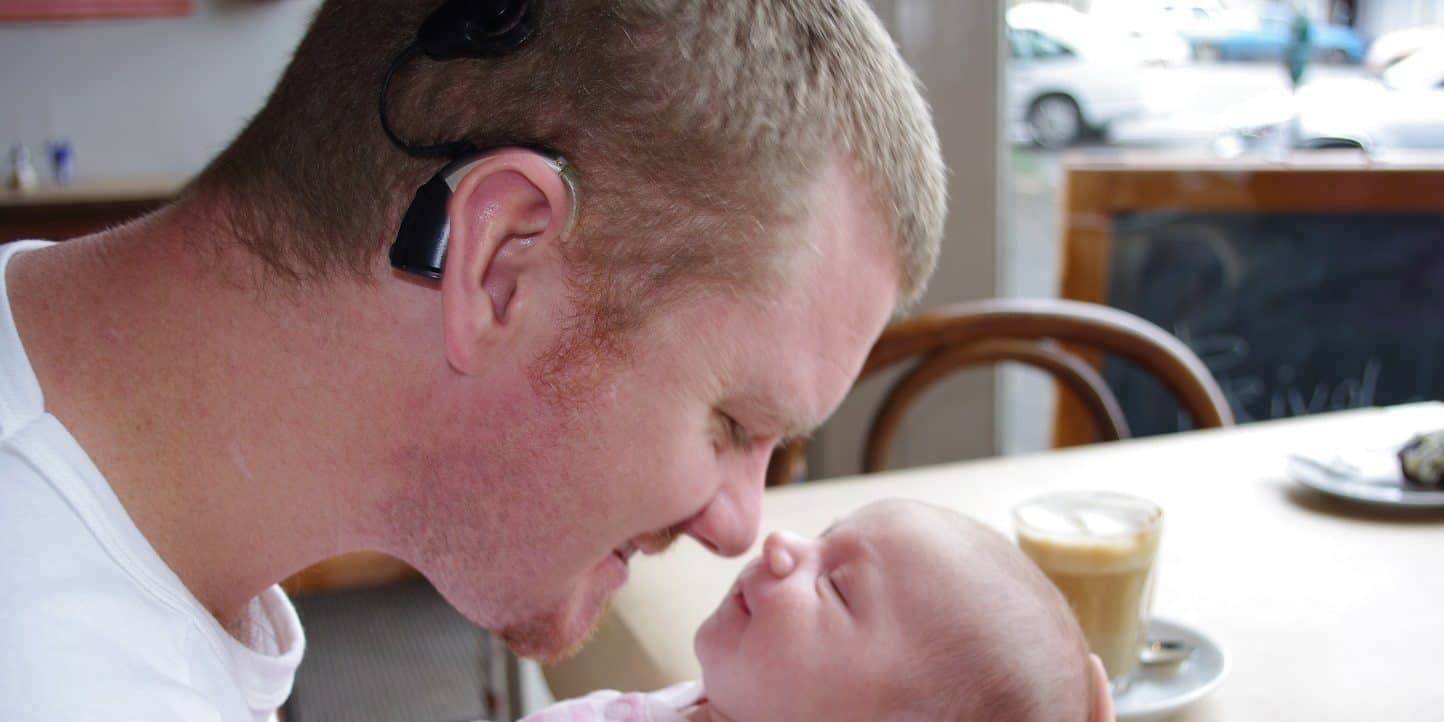Cochlear Implant Awareness Day 2023
On the 25th of February 2023, Ear Science, along with our clients and people from all around the world, come together to celebrate the life-changing impacts cochlear implants have.
Join us as we celebrate cochlear implants and their ability to give people access to the sounds of life.

To refer or not to refer | Exploring the benefits of referring clients for cochlear implants
In this Special Episode for audiologists and healthcare professionals, our guests are Senior Implant Audiologist & Cochlear Implant Research Lead Dr Cathy Sucher walks with Jody French who is a Cochlear Implant recipient.
Cathy and Jody will discuss some early findings from a recent study that has revealed a clearer view of why referral for Cochlear Implants is not as high as it should be, and what audiologists and other clinicians can do to help.
Your hearing won't heal itself, we can help
Hearing aids help many people, but as your hearing loss progresses, a cochlear implant may give you the clarity and volume you need to understand speech again.
Cochlear implants are life-changing devices that can help you hear sounds you no longer hear with your hearing aids, restoring your confidence and connecting you to loved ones.
What are cochlear implants?
A Cochlear Implant is a sophisticated electronic medical device that takes treating hearing loss to the next level, bypassing damaged sensory hair cells within the cochlea (inner ear) to directly stimulate auditory nerves.
A cochlear implant consists of two parts – the external sound processor which collects and processes the sound, converting it into a radio frequency signal that is sent through the skin and the internal implant which consists of the receiver-stimulator and electrode, which is inserted into the cochlea and provides electrical stimulation to the auditory nerve directly. This, in turn, takes the sound to the brain.
If you wear hearing aids? Ask yourself these questions
Do you often ask people to repeat themselves, even in a quiet room?
Do you avoid social activities because you may not follow what is being said?
Is it hard for you to talk on the phone, so you avoid using it?
Are you tired at the end of the day because listening takes so much concentration?
If you answered ‘Yes’ to any of these, a cochlear implant might be right for you.
Cochlear Implant Candidate Event
4 top differences between a hearing aid and a cochlear implant
Hearing aids and cochlear implants improve hearing for people diagnosed with sensorineural hearing loss when there is damage to the hair cells in the inner ear or the nerve pathways from the inner ear to the brain.
- A cochlear implant is surgically implanted by an ENT surgeon versus hearing aids fitted by a qualified audiologist.
- Hearing aids are completely removable versus cochlear implants, where you can only remove the external processor but not the implant.
- Hearing aids amplify sounds versus cochlear implants, which stimulate the auditory nerve to provide sound sensation.
- Cochlear implants use electrical signals versus acoustic signals with hearing aids.

Myth Busting Cochlear Implants: Rare and radical or routine treatment for severe hearing loss?
Senior Implant Audiologist Ronel Chester-Browne shares with us her knowledge and insights into Cochlear Implants.
This miraculous invention was once considered quite a rare and radical intervention. These days Cochlear Implants are routinely recommended for clients who audiologists identify would benefit from one.
Translating the latest Cochlear Implant science & research into clinical care
Dr Cathy Sucher, and the Ear Science Brain & Hearing Research collaborators have made significant contributions to our knowledge of hearing implants. The latest research shows:
- With many of our clients getting frustrated with communicating over a phone, research has shown that cochlear implant recipients will understand speech better on a mobile phone than on a standard telephone (Tan et al., 2012).
- Many people start their hearing journey with hearing aids to support them in listening environments. The research investigated the hearing outcomes for people with a successful hearing aid in one ear and a cochlear implant in the other ear. We found that improved hearing outcomes can be expected from those who used a hearing aid with a hearing implant—highlighting good speech perception in the other ear before it was implanted and shorter periods of hearing loss in the ear to be implanted are indicators of better results. Age and time since the other ear was implanted do not affect the outcomes (Smulders et al., 2018).
- With about 55% of people who get a cochlear implant having tinnitus, it has been shown that tinnitus symptoms usually significantly decrease after cochlear implantation, resulting in a better quality of life (Opperman et al. 2020; Assouly et al. in review).
- A collaborative team of qualified audiologists, scientists and specialists support our clients in their cochlear implant journey. Research proved that such an approach give hearing-impaired people the confidence to get a cochlear implant (Ebrahimi-Madiseh A, Eikelboom RH, Bennett RJ, Upson GS, Friedland P, Swanepoel DW, Atlas MD. Factors influencing postoperative experiences in adult cochlear implant recipients; a multi-stakeholder perspective. Otology and Neurotology. 43(8):882-888; 2022. 10.1097/MAO.0000000000003630).
- There is still an element of the unknown in predicting the hearing outcomes for cochlear implant recipients. We know that cochlear implants generally provide a good perception of speech, and it is currently possible to predict hearing outcomes with a 15 to 25% certainty (Goudey et al. 2021).

Your hearing won't heal itself, but we can help
Ear Science Implant Clinic is proudly Western Australia’s largest private hearing implant program.
Translating the latest research into surgical and clinical care with a comprehensive medical team including Ear Surgeons, qualified Hearing Implant Audiologists, and other specialists all dedicated to restoring your confidence, with appointments and surgery times to suit you.
Trust your hearing to the experts. Contact us and speak to people who have hearing implants.
References
Tan BYB, Gluth MB, Statham EL, Eikelboom RH, Atlas MD. Mobile and Landline Telephone Performance Outcomes Among Telephone-Using Cochlear Implant Recipients. Otolaryngology Head and Neck Surgery. 146(2):283-288; 2012. Smulders Y, Hendriks T, Stegeman I, Eikelboom RH, Sucher C, Upson GS, Chester-Browne R, Jayakody D, Santa Maria PL, Atlas MD, Friedland PL. Predicting Sequential Bilateral Cochlear Implantation Performance in Postlingually Deafened Adults; a Retrospective Cohort Study. Clinical Otolaryngology. 43(6):1500-1507; 2018. Opperman E, le Roux TE, Masenge A, Eikelboom RH. The effect of tinnitus on health-related quality of life outcomes in adult cochlear implant recipients. International Journal of Audiology. 60:246-254; 2021. Assouly K, Smit AL, Eikelboom RH, Sucher C, Atlas MD, Stokroos R, Stegeman I. Analysis of a cochlear implant database: changes in tinnitus distress after cochlear implantation. Trends in Hearing. 26;2022. Ebrahimi-Madiseh A, Eikelboom RH, Bennett RJ, Upson GS, Friedland P, Swanepoel DW, Psarros C, Lai WK, Atlas MD. What influences decision-making for cochlear implantation in adults? Exploring barriers and drivers from a multi-stakeholder perspective. Ear and Hearing. 41(6):1752-1763; 2020. Sucher CS, Eikelboom RH, Stegeman I, Jayakody DMP, Atlas MD. The Effect of Hearing Loss Configuration on Cochlear Implantation Uptake Rates: An Australian Experience. International Journal of Audiology. 59(11):828-834; 2020. Sucher CS, Eikelboom RH, Stegeman I, Atlas MD. Do cochlear implant outcomes differ within hearing loss configurations? CI2021 Cochlear implants in children and adults, April-May, 2021 [Poster]. Goudey B, Plant K, Kirala I, Jimeno-Yepes A, Swan A, Gambhir M, Buechner A, Kludt E, Eikelboom RH, Sucher C, Gifford R, Rottier R, Anjomshoa G. A multi-center analysis of established and novel factors associated with hearing outcome for adults with cochlear implants. Trends in Hearing. 25:1–17; 2021 Shafieibavania E, Kiral I, Goudey B, Zhonga P, Jimeno-Yepes A, Swan A, Gambhir M, Buechner A, Kludt E, Eikelboom RH, Sucher C, Gifford RH, Rottier R, Plant K, Anjomshoaa H. Predictive models for cochlear implant outcomes: performance, generalizability, and the impact of cohort size. Trends in Hearing. 25; 2021. Sucher C, Coetzee L, Liew A. Duration of hearing loss on cochlear implant outcomes for single-sided deafness: how long is too long? APSCI Conference, Nov 2021 [Poster]. Pike R, Prele C, Sucher C. Hunting for audiological markers of cochlear fibrosis in cochlear implant users. APSCI Conference, Nov 2021 [Poster].

